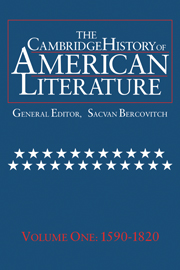Book contents
- Frontmatter
- Introduction
- THE LITERATURE OF COLONIZATION
- 1 The Papers of Empire
- 2 The Natural Inhabitants
- 3 Three Writers of Early America
- 4 Settlements
- 5 The Dispute of the New World
- 6 Traveling in America
- 7 The Final Voyage
- NEW ENGLAND PURITAN LITERATURE
- BRITISH-AMERICAN BELLES LETTRES
- THE AMERICAN ENLIGHTENMENT, 1750–1820
- THE LITERATURE OF THE REVOLUTIONARY AND EARLY NATIONAL PERIODS
- Chronology
- Bibliography
- Index
4 - Settlements
from THE LITERATURE OF COLONIZATION
Published online by Cambridge University Press: 28 March 2008
- Frontmatter
- Introduction
- THE LITERATURE OF COLONIZATION
- 1 The Papers of Empire
- 2 The Natural Inhabitants
- 3 Three Writers of Early America
- 4 Settlements
- 5 The Dispute of the New World
- 6 Traveling in America
- 7 The Final Voyage
- NEW ENGLAND PURITAN LITERATURE
- BRITISH-AMERICAN BELLES LETTRES
- THE AMERICAN ENLIGHTENMENT, 1750–1820
- THE LITERATURE OF THE REVOLUTIONARY AND EARLY NATIONAL PERIODS
- Chronology
- Bibliography
- Index
Summary
Chapter 9 of William Bradford's (1590–1657) Of Plymouth Plantation (written, 1630–46; published, 1857) contains perhaps the most frequently cited passage in colonial American writing. The chapter is entitled “Of Their Voyage, and How They Passed the Sea; and of Their Safe Arrival at Cape Cod.” After describing the arduous Atlantic crossing that brought the Pilgrims to the New World, Bradford signals a touchstone moment: “But here I cannot but stay and make a pause, and stand half amazed at this poor people's present condition; and so I think will the reader, too, when he well considers the same.” A long descent of readers has stood amazed at a vision of the Plymouth landing that long ago moved from history into myth. Bradford's immediate readers did not have to look far back; for them it was barely yet history. Indeed, Bradford made it history by establishing in it the parameters of an American legend.
Bradford began writing his history in 1630. The passage at hand comes early in the narrative, which at this point still draws heavily on a journal until recently attributed to Bradford himself and Edward Winslow (1595 – 1655) – author of Good News from New England (1624) – that had been published in London in 1622. (The current view is that the author remains uncertain.) A Relation or Journal of the Beginning and Proceedings of the English Plantation Settled at Plymouth in New England (generally referred to as Mourt's Relation, perhaps for George Morton, who saw it through the press) covers the events of the colony's first year, from September 1620 to March 1621, in a mostly matter-of-fact tone and with a good deal of concrete detail.
- Type
- Chapter
- Information
- The Cambridge History of American Literature , pp. 84 - 108Publisher: Cambridge University PressPrint publication year: 1994

